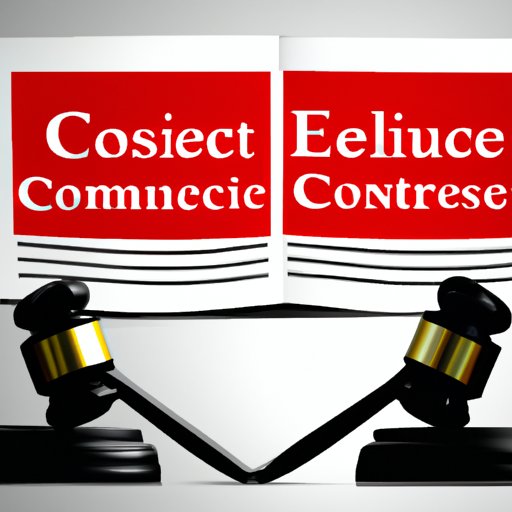Introduction
The commerce clause is an important part of the United States Constitution that grants Congress the power to regulate interstate commerce. The purpose of this article is to explore what the commerce clause is and what it means for businesses and society today.
Exploring the Commerce Clause: What is it and What Does it Mean?
The commerce clause was first introduced in Article I, Section 8 of the United States Constitution in 1787. The text of the clause states: “The Congress shall have Power … To regulate Commerce with foreign Nations, and among the several States, and with the Indian Tribes.” This clause gives Congress the authority to regulate any form of interstate commerce. This includes trade, transportation, navigation, communication, and other forms of economic activity.
The commerce clause has a significant impact on businesses operating in the United States. It allows the federal government to pass laws that govern interstate commerce, such as those related to antitrust, labor, and environmental protection. These laws can be used to protect consumers and ensure fair competition among businesses.
Examining the History of the Commerce Clause and Its Significance Today
The commerce clause has evolved over time as the needs of the nation have changed. During the 19th century, the clause was used to promote free trade and to prevent states from enacting protectionist policies. In the 20th century, it was used to regulate industries, such as railroads and airlines, that had become too powerful. In recent years, it has been used to regulate the internet, telecommunications, and other forms of technology.
Today, the commerce clause is still an important tool for regulating interstate commerce. It is used to protect consumers and ensure fair competition among businesses. It also plays an important role in protecting the environment by allowing the federal government to pass laws that regulate pollution and other forms of environmental degradation.

A Comprehensive Overview of the Commerce Clause and Its Implications
The commerce clause covers a wide range of activities, including trade, transportation, communication, and other forms of economic activity. The types of regulations governed by the commerce clause include antitrust laws, labor laws, environmental protection laws, and consumer protection laws. These laws are designed to protect consumers, promote competition, and protect the environment.
The commerce clause also has a significant impact on economic activity. It allows the federal government to pass laws that regulate economic activity, such as those related to taxes, tariffs, and trade agreements. These laws can be used to encourage or discourage certain types of economic activity.
Analyzing the Supreme Court’s Interpretation of the Commerce Clause
The Supreme Court has played an important role in interpreting the commerce clause. Over the years, the court has handed down several landmark decisions related to the clause, such as Wickard v. Filburn (1942), South-Central Timber Development, Inc. v. Wunnicke (1984), and Gonzales v. Raich (2005). These cases have helped to define the scope of the clause and its implications for businesses and society.
The Supreme Court has also taken a more expansive view of the commerce clause in recent years. In Gonzales v. Raich (2005), the Court held that Congress could use the commerce clause to regulate activities that do not involve interstate commerce, such as the cultivation and possession of marijuana for personal use.
Conclusion
The commerce clause is an important part of the United States Constitution that grants Congress the power to regulate interstate commerce. It has evolved over time to address changing needs, and it continues to play an important role in protecting consumers, promoting competition, and protecting the environment. The Supreme Court has played an important role in interpreting the clause, and its decisions have helped to define the scope of the clause and its implications for businesses and society.
In conclusion, the commerce clause is a vital part of the United States Constitution, and it has a significant impact on businesses and society. Understanding the history and implications of the clause is essential for businesses operating in the United States.
(Note: Is this article not meeting your expectations? Do you have knowledge or insights to share? Unlock new opportunities and expand your reach by joining our authors team. Click Registration to join us and share your expertise with our readers.)
